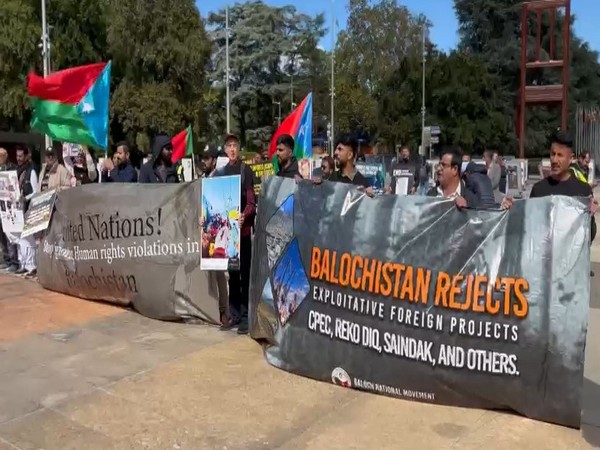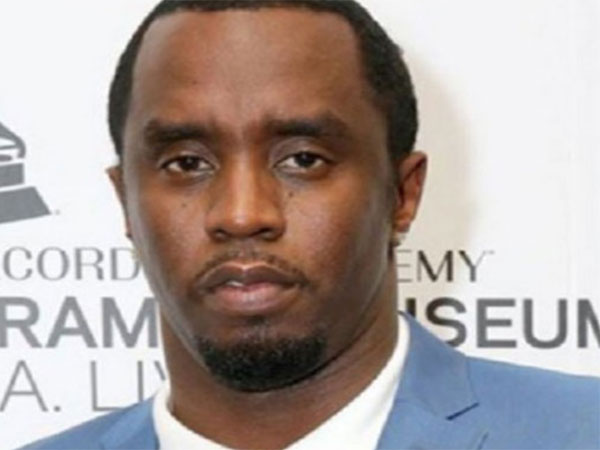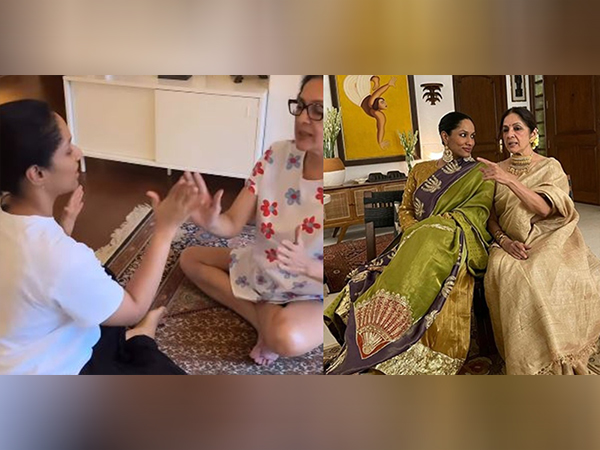Geneva [Switzerland], September 18 (ANI): The Baloch National Movement (BNM) organised a protest demonstration and photo exhibition outside the United Nations office in Geneva on Tuesday, gathering a large number of activists in front of the iconic Broken Chair monument.
The protest held during the 57th UN Human Rights Session highlighted widespread human rights violations in Balochistan and called for the region’s freedom.
Participants passionately raised slogans against the ongoing repression in Balochistan, emphasising the dire conditions faced by local communities. The demonstration also targeted China, criticising its presence in the region as part of the China-Pakistan Economic Corridor (CPEC) project, which has long been a point of contention for the Baloch people.
Some of the protesters spoke to ANI, highlighting the conditions of the Baloch people as well as the Uyghurs.
While speaking to ANI Executive Director, Stop Uyghur Genocide, Rahima Mahmut said, “I’m here to show my solidarity with the people of Balochistan, and I understand that the Baluchistan people share the fate of the Uyghurs, that they are also suffering persecution by the Pakistani military, and like Uyghurs, we’ve been suffering persecution for the last seven eight decades under the Chinese Communist Party.”
“And therefore, as Uyghur, I feel it is important that we should stand together to support one another and to shout very loudly that you are not alone. And we are here to support. And we condemn the oppression by Pakistan and ultimately China,” she added.
Further, researcher and political activist Jaffer Mirza emphasised the urgent need for Pakistan to address the grievances of the Baloch people during the 57th Human Rights Session in Geneva and stressed that Pakistan must recognise and respect the rights of the Baloch people, including their basic human dignity and human rights.
“I’m in Geneva during the 57th Human Rights Session. I’m here to join the protests organised by the Baloch National Movement. There are a couple of demands they’re asking for, and one of them is ending forced experiences in Pakistan and the exploitation of mineral resources and other economic things. And they’re also asking for the basic human rights of the Baloch people. I think one thing that Pakistan needs to understand, they cannot continue the way they think. More violence will generate more resistance, and the state persecution makes it more resilient.” he said.
“So the Balochistan issue is not complicated, it’s very basic. They’re asking for some basic things, which include human rights, and basic human dignity, and demand that Balochistan’s rights are recognised and respected. The campaign against enforced disappearances in Pakistan is getting recognition, not just in Pakistan but all over the world. Pakistan needs to make a decision about where and how it wants to tackle or address these Baloch grievances. If they continue the way things are, things will be really difficult for everyone in Pakistan. And enforce disappearances in Pakistan and give Baloch their rights,” he added.
Outside the United Nations in Geneva, Peter Tatchell, a British human rights activist, voiced his support for the people of Balochistan, condemning Pakistan’s occupation since 1948. Tatchell emphasised that Pakistan’s military measures, including forced abductions, disappearances, and extrajudicial killings, are egregious violations of international law.
“We’re here outside the United Nations in Geneva to lend our support to the human rights and national liberation struggle of the people of Balochistan. The country has been occupied by Pakistan since 1948 and it’s held by Pakistan using the most brutal repressive military measures, including forced abductions disappearances and extrajudicial killings. These crimes are against international law. Pakistan must be held accountable,” Tatchell said to ANI.
“The West must cease all military aid to Pakistan because those weapons are being diverted to suppress the people of Balochistan. The Commonwealth must suspend Pakistan. It is violating the Commonwealth Charter and the human rights principles that the Commonwealth espouses. Moreover, we must have global sanctions against Pakistan’s political and military leaders. They are complicit in the conduct of war crimes and crimes against humanity,” he added.
The photo exhibition attracted significant attention, offering a stark portrayal of the miseries and hardships endured by the Baloch population. Visitors were given a visual insight into the devastating impact of military operations, disappearances, and resource exploitation in the region.
The protest drew further support from Uyghur activists, who joined forces with the Baloch to denounce China’s role in the China-Pakistan Economic Corridor (CPEC) project. This CPEC project connects Balochistan’s Gwadar port to Xinjiang, where Uyghurs have similarly faced severe state repression.
Both groups highlighted concerns over resource exploitation and the violation of local rights due to these large-scale development projects.
Opposition to the multi-billion-dollar development in Gwadar remains strong, with locals accusing the CPEC project of exploiting their natural resources without benefiting the indigenous population.
The BNM vowed to continue its campaign for the freedom of Balochistan and against the suppression of its people. (ANI)
Disclaimer: This story is auto-generated from a syndicated feed of ANI; only the image & headline may have been reworked by News Services Division of World News Network Inc Ltd and Palghar News and Pune News and World News
HINDI, MARATHI, GUJARATI, TAMIL, TELUGU, BENGALI, KANNADA, ORIYA, PUNJABI, URDU, MALAYALAM
For more details and packages
















